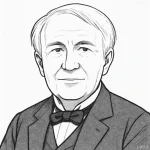“I live in that solitude which is painful in youth, but delicious in the years of maturity.”

- March 14, 1879 – April 18, 1955
- German-born Jew
- Physicist
table of contents
Quote
“I live in that solitude which is painful in youth, but delicious in the years of maturity.”
Explanation
In this quote, Einstein reflects on the evolving nature of solitude and how its meaning and value change as one grows older. When young, solitude can often feel isolating and uncomfortable, as youth is typically a time when people seek connection and validation from others. However, as we mature, solitude becomes something to savor—a space for reflection, creativity, and peace. For Einstein, solitude offered the freedom to explore his thoughts deeply, fostering the creativity and insight that marked his scientific work.
Historically, many thinkers, writers, and artists have found value in solitude. Figures like Henry David Thoreau and Virginia Woolf viewed it as a wellspring of inspiration and introspection. Their ability to embrace solitude allowed them to produce profound work and develop unique perspectives. Solitude, for them, was less a withdrawal from society than an opportunity to connect more deeply with their inner selves.
In today’s fast-paced and interconnected world, Einstein’s words serve as a reminder that time alone is essential for personal growth and clarity. Amid constant connectivity and external influences, solitude allows us to step back, process experiences, and cultivate inner strength. Embracing solitude in maturity can lead to greater self-awareness and a deeper appreciation for one’s own thoughts, making it a source of comfort and wisdom rather than loneliness.
Would you like to share your impressions or related stories about this quote in the comments section?



